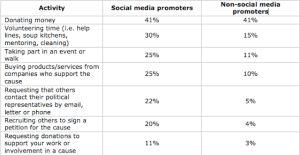Millennials have been accused more than a few times of being lazy, slackers, and ultimately the generation looking for a handout. While that may debated (is that said of every young generation), there’s one trend that has taken off in the past twenty years, that millennials have certainly perfected – slacktivism.

Depending on where you look, definitions of slacktivism can vary, but it looks like the word originated in the mid-1990s. Essentially it is “slacker activism” or supporting a cause or making a motion of support toward an issue without exerting much actually effort or physical support to address the issue at hand. The actions make the individual feel better about themselves, but do little to contribute to the cause or actively make a difference with the topic at hand.
Think about the last time you signed an online petition, retweeted someone, liked or shared a Facebook post with the encouragement to support a cause, or even proclaimed an end of your patronage to a specific company, product or restaurant because you disagree with the organization’s philosophy (Muck Boots or HSUS, anyone?).
Do those actions really make a difference? Did you actually make a change in your consumption habits or did you really donate to the designated cause? With all of those ice bucket challenges being passed around, are ALS organizations actually receiving the funds to fight a disease? Could we be doing more to actively address the problem?
I have to give the nod to a friend from Billings, Chaley Harney, for bringing this word to my attention after my recent Muck Boots posts. The more I think about it, the more it makes sense. These “armchair activists” can be credited with raising quite a fuss online in recent years, but are they really making a difference?
Researchers are undecided. The Washington Post points out a 2014 study that cites our slactivists are less likely to make an actionable contribution to a cause after publicly announcing their support (i.e. liking a Facebook post, retweeting, or participating in the latest challenge). Mashable pointed me toward a 2011 study from Georgetown University that suggests slacktivists participate in more campaigns are raise awareness of causes which otherwise may go unnoticed.
In agriculture circles, I think we’re just as guilty of slacktivism as many other groups online today. I’ve seen several campaigns share in Facebook statuses. We’ve called out restaurant chains and businesses for their support of the Humane Society of the United States, and even campaigned against restaurants like Panera Bread Company and Chipotle Mexican Grill. Agriculture circles even proclaim their dislike, distrust, and even disgust, for prominent slacktivists in food circles like Food Babe.
You have to give it to the slacktivists though, sometimes they do put on a show of quite a bit of enthusiasm and perseverance, at least for a while. Take for example the anti-GMO crowd bombarding Cheerio’s social media streams, campaigning against the inclusion of GMO ingredients, to the point where General Mills changed their sourcing of ingredients in question. How many campaigners actually changed their buying habits after proclaiming their distrust of GMO ingredients?
Yellow Tail wine became the focus of slacktivism when South Dakota rancher Troy Hadrick campaigned by pouring out his wine in February 2010 after their donation to HSUS, which was later rescinded. And PETA seems to champion slacktivism with their animal cruelty campaigns to solicit donations. Some would argue the group is even affecting the perception of livestock farming with their materials which become viral among online users.
Some of these campaigns have resulted in positive change and raising awareness of the issues, while others close doors for future conversations or make participants look like an angry pitchfork mob.
Whichever side of the discussion, you fall upon, I think we can agree that slacktivism campaigns have become the norm and they do raise social awareness of issues, important causes or not. We can all do our part as individuals to make our physical, active, and beneficial contributions to causes that matter. Next time you go to share that viral Facebook post, consider what you could be doing to make a difference. Don’t rely on just sending out a tweet to show your support.

